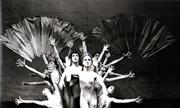Equus - Segal Centre of Arts
More Praise for Equus
Equus continues to astound audiences, thanks to Dan Jeanotte's haunting performance as Allan Strang
by ANNA FUERSTENBERG
In 1976, on my way from Boulder Colorado to Montreal, I stopped in New York City to see Equus, and I remember with great clarity that at the intermission I could not breathe. The play had stolen all the
oxygen in the theatre; it was that good. Douglas Campbell played the psychiatrist Dysart with enormous compassion and that richly timbered voice. It felt as though all the tough decisions I had
made about a life in the theatre were clarified that night.
It was with some trepidation that I went last season to see the same play at the Rialto and I was surprisingly delighted. Noel Burton was so comfortable and warm in his performance that the entire play was immensely satisfactory. I remember Nadia Verducci’s splendid work and the heroic choreography of Jacqueline Van de Geer. Paul Van Dyck had done an admirable directing job and it all worked on a tiny budget in an awkward and intimate space.
I understand why the Segal would choose to mount this classic. It is determinately theatrical and every viewing of this work brings new things to mind. On the struggle of the psychiatrist with the job of turning the passionate into the banked cinders of acceptable behaviour, playwright Peter Shaeffer wrote: “The average made lethal”. His writing is flawless.
The Segal’s production, directed and choreographed by Domy Reiter-Soffer, was indeed as astonishing and beautiful as one might have hoped. Reiter-Soffer’s choreography was a delight. The
horses were beautifully danced and Dan Jeanotte gave a magnificent performance as the disturbed Allan Strang. Jeannotte’s passion was magical; his acting utterly convincing. It made the rest work.
Daniel Gilford was excellent as Allan’s father, Frank Strang and Patricia Summerset was a quite convincing Jill. Susan Glover had some very nuanced moments in her role as Hester Soloman, but
often these gestures fell on Dr. Dysart’s back as he faced the audience down center. Ellen David who is usually in command on stage, did not quite find her feet as the mother. Her voice seemed to be
caught at an awkward pitch, which given its beauty, made for a strained performance. Jean Marchand as Dysart seemed to suffer from a lack of security in his delivery. Perhaps it was the accent. He rallied
in the final scene, but many of Shaeffer’s stirring monologues did not reach the powerful heights they should have hit. He seemed to be always down center facing the audience.
It seemed a bit odd that a company that spends thousands on a production could not find two believable wigs. The set was fabulous and for the first time one had the sense of the immensity of this
stage. But no one ever used those great curved structures. Much of theatrical blocking, even during the dialogues, had the actors awkwardly addressing the audience.
These, however, are merely quibbles because Shaeffer’s text remains such a runaway train of drama and exhilaration, that no one who loves the theatre should miss the experience of watching this production and its fantastic lead.
![/images/pictures/Sarah[1].jpg](/images/pictures/Sarah[1]_thumbnail.jpg)
